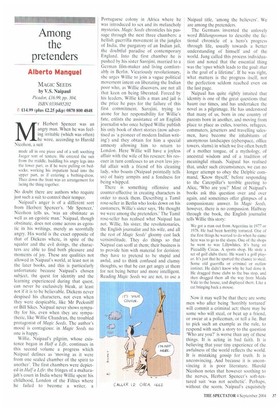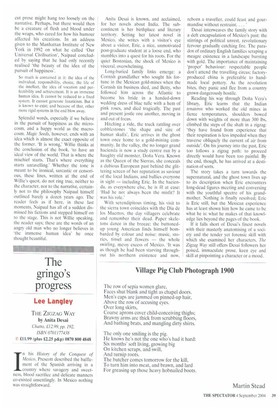Among the pretenders
Alberto Manguel
MAGIC SEEDS by V.S. Naipaul
Picador, £16.99, pp. 304, ISBN 0330485202 £14.99 (plus £2.25 p&p) 0870 800 4848 mr Herbert Spencer was an angry man. When he was feeling irritable (which was often) he wore, according to Harold Nicolson, a suit
made all in one piece and of a soft soothing Jaeger sort of texture. He entered the suit from the middle, huddling his angry legs into the lower part, as if he were pulling on bedsocks: working his impatient head into the upper part, as if entering a bathing-dress. Then down the front was an arrangement for lacing the thing together.
No doubt there are authors who require just such a suit to control their temper.
Naipaul's anger is of a different sort from Herbert Spencer's. 'Mr Spencer,' Nicolson tells us, was an obstinate as well as an egoistic man.' Naipaul, though obstinate, does not come across as egoistic in his writings, merely as scornfully angry. His world is the exact opposite of that of Dickens where, in spite of the squalor and the evil doings, the characters are able to find both pleasure and moments of joy. These are qualities not allowed in Naipaul's world, at least not in the later books, and this is particularly unfortunate because Naipaul's chosen subject, the quest for identity and the learning experienced during that quest, can never be exclusively bleak, at least not if it is to be believable. Dickens never despised his characters, not even when they were despicable, like Mr Pecksniff or Bill Sikes. Naipaul never shows sympathy for his, even when they are sympathetic, like Willie Chandran, the troubled protagonist of Magic Seeds. The author's mood is contagious: in Magic Seeds no one is happy.
Willie. Naipaul's pilgrim, whose existence began in Half a Life, continues in this second volume a progress which Naipaul defines as 'moving as it were from one sealed chamber of the spirit to another'. The first chambers were depicted in Haifa Life: the fringes of a maharajah's court in India where Willie spent his childhood, London of the Fifties where he failed to become a writer, a Portuguese colony in Africa where he was introduced to sex and its melancholy mysteries. Magic Seeds chronicles his passage through the next three chambers: a hellish guerrilla movement in the jungles of India, the purgatory of an Indian jail, the doubtful paradise of contemporary England. Into the first chamber he is pushed by his sister Sarojini, married to a German film-maker and living comfortably in Berlin. Vicariously revolutionary, she urges Willie to join a vague political movement intent on liberating the Indian poor who, as Willie discovers, are not all that keen on being liberated. Forced by his leaders, Willie kills a man and jail is the price he pays for the failure of this first commitment. Sarojini, trying to atone for her responsibility for Willie's fate, enlists the assistance of an English journalist who once helped Willie publish his only book of short stories (now advertised as 'a pioneer of modern Indian writing') and they obtain for him a special amnesty allowing him to return to London. Here Willie will have a joyless affair with the wife of his rescuer; his rescuer in turn confesses to an even less joyful affair with a friend of his cleaning lady, who boasts (Naipaul pointedly tells us) of hairy armpits and a fondness for being whipped.
There is something offensive and counter-effective in creating characters in order to mock them. Describing a Tamil rose-seller in Berlin who looks down on his customers, Willie's sister says, 'He thought we were among the pretenders.' The Tamil rose-seller has realised what Naipaul has not. Willie, his sister, the revolutionaries, the English journalist and his wife, and all the rest of Magic Seeds' gloomy cast lack verisimilitude. They do things so that Naipaul can scoff at them; their business is to provide him with material for derision; they have to pretend to be stupid and awful, and to think confused and clumsy thoughts, so that he can get angry at them for not being better and more intelligent. Reading Magic Seeds we are not, to use a
Naipaul title, 'among the believers', We are among the pretenders.
The Germans invented the unlovely word Bildungsroman to describe the fictional chronicle of a hero's progress through life, usually towards a better understanding of himself and of the world. Jung called this process individuation and noted that the essential thing was the 'opus which leads to the goal: that is the goal of a lifetime'. If he was right, what matters is the progress itself, not the perfection seldom reached even on the last page.
Naipaul has quite rightly intuited that identity is one of the great questions that haunt our times, and has undertaken the novel as a pilgrimage. He has understood that many of us, born in one country of parents born in another, and moving from place to place as exiles, tourists, refugees, commuters, jetsetters and travelling salesmen, have become the inhabitants of anonymous landscapes (cyberspace, office towers, slums) in which we live often bereft of a mother tongue, of a mythology, of ancestral wisdom and of a tradition of meaningful rituals. Naipaul has realised that, under such circumstances, we can no longer attempt to obey the Delphic command, 'Know thyself,' before responding to the Caterpillar's terrible greeting to Alice, 'Who are you?' Most of Naipaul's books ask this question over and over again, and sometimes offer glimpses of a compassionate answer. In Magic Seeds, however, there is no compassion. Halfway through the book, the English journalist tells Willie this story:
We got a man out from Argentina in 1977 or 1978. He had been horribly tortured. One of the first things he wanted to do when he came here was to go to the shops. One of the shops he went to was Lillywhites. It's bang on Piccadilly Circus. A sports shop. He stole a set of golf clubs there. He wasn't a golf player. It's just that he spotted the chance to steal. Some old guerrilla or criminal or outlaw instinct. He didn't know why he had done it. He dragged those clubs to the bus stop, and then dragged them all the way from Maida Vale to the house, and displayed them. Like a cat bringing back a mouse.
Now it may well be that there are some men who after being 'horribly tortured' will commit a criminal act: there may be some who will steal, or beat up a friend, or swear at a policeman, or tell a lie. But to pick such an example as the rule, to respond with such a story to the question 'Who are you?' is worse than any of these things. It is acting in bad faith. It is believing that your tiny experience of the awfulness of the world reflects the world. It is mistaking gossip for truth. It is unconvincing. And because it is unconvincing it is poor literature. Harold Nicolson notes that however soothing to the nerves, Herbert Spencer's soft-textured suit 'was not aesthetic'. Perhaps, without the scorn, Naipaul's exquisitely
cut prose might hang too loosely on the narrative. Perhaps, but there would then be a creature of flesh and blood under the wraps, who cared for how his humour affected his creations. In an address given to the Manhattan Institute of New York in 1992 on what he called 'Our Universal Civilisation', Naipaul concluded by saying that he had only recently realised 'the beauty of the idea of the pursuit of happiness'.
So much is contained in it: the idea of the individual, responsibility, choice, the life of the intellect, the idea of vocation and perfectibility and achievement. It is an immense human idea. It cannot be reduced to a fixed system. It cannot generate fanaticism. But it is known to exist; and because of that. other more rigid systems in the end blow away.
Splendid words, especially if we believe in the pursuit of happiness as the microcosm, and a happy world as the macrocosm. Magic Seeds, however, ends with an idea which is almost the exact opposite of the former. 'It is wrong,' Willie thinks at the conclusion of the book, `to have an ideal view of the world. That is where the mischief starts. That's where everything starts unravelling.' Whether the tone is meant to be ironical, sarcastic or censorious, these lines, written at the end of Willie's quest, do not ring true, neither to the character, nor to the narrative, certainly not to the philosophy Naipaul himself outlined barely a dozen years ago. The reader feels as if here, in these last moments, Naipaul has all of a sudden dismissed his fictions and stepped himself on to the stage. This is not Willie speaking, the reader says; these are the words of an angry old man who no longer believes in 'the immense human idea' he once thought beautiful.



































































 Previous page
Previous page